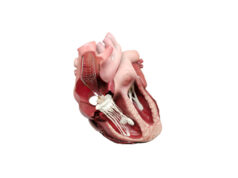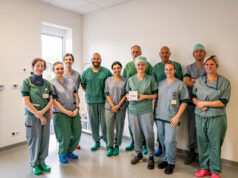Micro Interventional Devices has announced that its minimally invasive annuloplasty (MIA) technology has been successfully used for the first time to perform a tricuspid valve bicuspidisation procedure. The bicuspidisation, a press release reports, resulted in a 34.5% reduction in valve area, reducing the patient’s tricuspid regurgitation from severe/moderate to trace.
According to the press release, the patient was the fourth to be enrolled in Micro Interventional Devices’s STTAR (Study of transcatheter tricuspid annular repair) trial and they were treated with a second-generation MIA implant. The implant is designed to allow for greater annular reduction with fewer implants. The procedure was performed by Kestutis Rucinskas (chief of Cardiac Surgery) and Audrius Aidietis (chief of Cardiology and Angiology) at the Vilnius University Hospital Santariskiu Clinic (Vilnius, Lithuania). As with the other STTAR cases, there were no intraoperative complications or adverse events observed or reported.
By using a bicuspidisation approach with the second-generation technology, the press release states, the annular reduction may prove to be easier, faster and more durable. The tricuspid repair portion of the procedure was completed in 15 minutes. All four patients in the trial have been successfully treated with 100% procedural success and no adverse events reported
Michael Whitman, the president and chief executive officer of Micro Interventional Devices, comments: “This patient represents an evolution in the clinical use of MIA. This is the first time MIA was used to perform a bicuspidisation of the patient’s tricuspid valve. The shift to a bicuspidisation approach on our fourth patient provided a superior outcome and was easier to perform than our initial three patients. This is not surprising as clinical experience is applied to greater procedural affect. The acute results for this patient appear comparable to open bicuspidisation procedures.”










